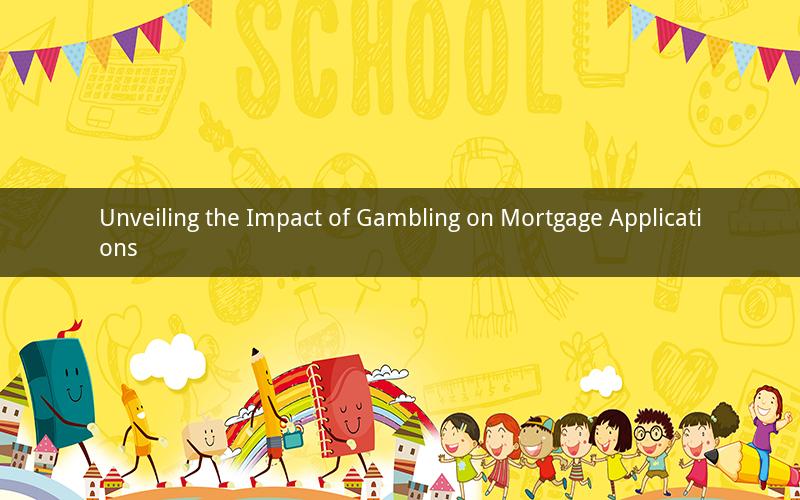
Introduction:
Gambling, a controversial activity that has both positive and negative repercussions, often raises concerns among lenders and financial institutions. One of the most common queries is how gambling can affect a mortgage application. This article delves into the intricacies of this relationship, highlighting the potential risks and implications for borrowers.
The Role of Credit Scores in Mortgage Applications
Credit scores play a crucial role in determining the eligibility and interest rates for mortgage loans. They provide lenders with an insight into a borrower's creditworthiness and financial habits. As gambling can significantly impact credit scores, it becomes an essential factor in mortgage applications.
1. How does gambling affect credit scores?
Gambling does not directly affect credit scores, but its consequences can indirectly influence them. Engaging in excessive gambling can lead to financial strain, which might result in late payments, defaults, or even bankruptcy. These financial hardships can, in turn, negatively impact credit scores.
2. Can winning at gambling improve credit scores?
Winning at gambling does not automatically improve credit scores. Credit scores are primarily based on payment history, debt levels, credit mix, and the length of credit history. While winning might increase a borrower's disposable income, it does not guarantee a direct boost in credit scores.
The Potential Risks of Gambling in Mortgage Applications
1. Higher interest rates:
Lenders might perceive borrowers with gambling habits as higher risks, leading to increased interest rates on mortgage loans. This is because gambling can be an indication of poor financial management and potential financial instability.
2. Loan denials:
In some cases, lenders might deny mortgage applications altogether if they suspect a borrower has gambling-related financial issues. This is particularly true if the borrower's credit report reveals signs of financial distress due to gambling.
3. Requirement for larger down payments:
Borrowers with gambling habits may be asked to provide larger down payments to mitigate the perceived risk. This could result in increased upfront costs and a longer wait time for homeownership.
Strategies to Mitigate the Impact of Gambling on Mortgage Applications
1. Financial management:
Borrowers should maintain a well-structured budget and avoid excessive spending on gambling. Prioritizing financial obligations, such as mortgage payments, helps in maintaining a healthy credit score and reducing the risk of loan denials.
2. Responsible gambling:
Borrowers should engage in responsible gambling, setting limits on their spending and avoiding gambling when under financial strain. This can help in preventing financial distress and maintaining a positive credit score.
3. Seeking professional advice:
Consulting a financial advisor can help borrowers manage their finances effectively and address any potential gambling-related issues. Financial advisors can offer personalized advice and strategies to improve credit scores and increase the chances of mortgage approval.
Conclusion:
Gambling can have a significant impact on mortgage applications, primarily through its indirect influence on credit scores. Borrowers should be aware of the potential risks and take proactive steps to mitigate the impact of gambling on their financial well-being. By maintaining responsible gambling habits, effective financial management, and seeking professional advice when needed, borrowers can improve their chances of obtaining favorable mortgage terms.
Additional Questions and Answers:
1. Can gambling affect refinancing a mortgage?
Yes, gambling can affect refinancing a mortgage. Similar to the initial mortgage application process, lenders will assess a borrower's creditworthiness, including their gambling habits, to determine the eligibility for refinancing.
2. Are there any specific types of gambling that are more concerning to lenders?
Lenders typically view all forms of gambling as risky, but certain types, such as high-stakes gambling or online gambling, might be considered more concerning due to their potential for excessive spending and financial strain.
3. Can borrowers with gambling habits still qualify for a mortgage?
Yes, borrowers with gambling habits can still qualify for a mortgage, but they may need to provide additional documentation to demonstrate their financial stability and responsible gambling behavior.
4. How long does it take for gambling-related financial issues to impact credit scores?
Gambling-related financial issues, such as late payments or defaults, can take several months to reflect on a borrower's credit report and affect their credit scores.
5. Can borrowers dispute gambling-related financial issues on their credit report?
Borrowers can dispute gambling-related financial issues on their credit report if they believe the information is inaccurate or misleading. However, it is essential to provide evidence to support their claim.